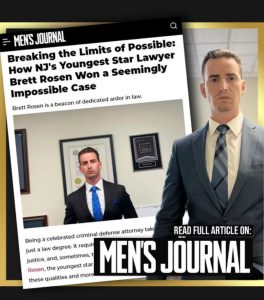Does a Child Victim Have to Testify in a Criminal Trial in New Jersey? Understanding the Tender Years Doctrine and Protecting Children in Court - A Comprehensive Guide by Brett M. Rosen, Esq.
Child Victim Testimony in a Criminal Trial in New Jersey

When a child is the victim of a crime, the question of whether they must testify in court is a delicate balance between seeking justice and protecting the child’s well-being. New Jersey law recognizes the unique vulnerabilities of child victims and provides certain safeguards to minimize trauma and ensure their best interests are prioritized. This comprehensive guide will delve into the laws and procedures surrounding child testimony in New Jersey criminal trials, with a particular focus on the “Tender Years Doctrine,” providing valuable insights and legal guidance for parents, guardians, and those facing charges involving child victims.
The Tender Years Doctrine in New Jersey
The Tender Years Doctrine is a legal principle that recognizes the special needs and vulnerabilities of young children, particularly in the context of legal proceedings. It acknowledges that children may be more susceptible to suggestion, manipulation, and trauma, and therefore require additional protections to ensure their well-being and the integrity of the legal process. N.J.R.E. 803(c)(27): This rule of evidence allows for the admission of a child’s out-of-court statement describing an act of sexual abuse if the statement was made under circumstances that indicate its trustworthiness.
In New Jersey, the Tender Years Doctrine has been codified in various statutes and court rules, particularly in cases involving child abuse, sexual assault, and domestic violence. It influences several aspects of child testimony, including:
- Competency to Testify: The court carefully assesses a child’s ability to understand the oath, recall events accurately, and communicate effectively before allowing them to testify.
- Minimizing Trauma: Courts are encouraged to create a supportive environment for child witnesses, allowing for accommodations such as closed-circuit television testimony or the use of therapy dogs.
- Admissibility of Hearsay: New Jersey has specific hearsay exceptions that allow certain out-of-court statements made by a child to be admitted as evidence, even if the child does not testify. This recognizes that children may be more comfortable disclosing information in a non-courtroom setting.
Specific Laws and Cases Related to Child Testimony in New Jersey
- N.J.S.A. 2A:84A-32.4: This statute allows for the use of closed-circuit television (CCTV) testimony for child victims in certain cases, such as sexual assault, child abuse, and domestic violence.
- State v. D.R.H. (127 N.J. 249 (1992)): This landmark case established that a child’s out-of-court statements about abuse can be admissible in court under certain circumstances, even if the child does not testify.
- State v. Smith (158 N.J. 376 (1999)): This case further clarified the admissibility of a child’s out-of-court statements, emphasizing the need for reliability and trustworthiness.
Does a Child Victim Have to Testify?
While there is no absolute exemption for child victims from testifying, New Jersey law provides several mechanisms to protect them and make the process less daunting:
1. Competency to Testify:
- Understanding the Oath: Before testifying, a child must demonstrate that they understand the difference between the truth and a lie and the importance of telling the truth under oath.
- Ability to Recall and Communicate: The child must be able to recall events and communicate them effectively to the judge and jury.
- Court Determination: The judge will ultimately determine whether a child is competent to testify based on their age, maturity, and ability to understand and communicate.
2. Minimizing Trauma:
- Supportive Environment: Courts are encouraged to create a supportive environment for child witnesses, which may include allowing a support person to be present during testimony, using age-appropriate language, and providing breaks when needed.
- Closed-Circuit Television (CCTV): In certain cases, a child may be allowed to testify via closed-circuit television, allowing them to avoid direct confrontation with the defendant. This requires a court order and a finding that testifying in open court would cause severe emotional distress to the child.
- Videotaped Statements: In some cases, a child’s prior out-of-court statements, such as those made to a therapist or forensic interviewer, may be admissible in court as evidence, potentially reducing the need for live testimony.
3. Alternatives to Live Testimony:
- Hearsay Exceptions: New Jersey has specific hearsay exceptions that allow certain out-of-court statements made by a child to be admitted as evidence, even if the child does not testify. This often applies to statements made to medical professionals, teachers, or child protective services workers. This is particularly relevant under the Tender Years Doctrine, as it recognizes the difficulty young children may have in recounting traumatic experiences in a formal court setting.
- Expert Testimony: An expert witness, such as a child psychologist or forensic interviewer, may testify about a child’s behavior or statements, providing context and supporting the child’s account.
4. The Child’s Best Interests:
- Guardian Ad Litem: In some cases, the court may appoint a guardian ad litem to represent the child’s best interests throughout the legal process. The guardian ad litem will investigate the situation and make recommendations to the court about what is in the child’s best interest, including whether testifying is appropriate.
- Balancing Interests: The court must balance the child’s best interests with the need for justice and the defendant’s right to a fair trial.
Defenses Related to Child Testimony
If you are facing charges involving a child witness, an experienced criminal defense attorney like Brett M. Rosen, Esq. can explore various defenses related to the child’s testimony, including:
- Challenging Competency: Questioning the child’s competency to testify based on their age, understanding, or ability to communicate.
- Suggestibility: Arguing that the child’s testimony has been influenced by suggestive questioning or coaching by adults. This is particularly relevant under the Tender Years Doctrine, as young children may be more susceptible to suggestion.
- Inconsistencies: Highlighting inconsistencies in the child’s statements or testimony.
- Lack of Corroboration: If the child’s testimony is not supported by other evidence, it may be less credible.
- Alternative Explanations: Providing alternative explanations for the child’s statements or behavior.
FAQs about Child Testimony and the Tender Years Doctrine in New Jersey
What is the Tender Years Doctrine?
- The Tender Years Doctrine is a legal principle that recognizes the special needs and vulnerabilities of young children in legal proceedings and aims to protect them from further trauma.
How does the Tender Years Doctrine affect child testimony in New Jersey?
- It influences how the court assesses a child’s competency to testify, allows for accommodations to minimize trauma, and broadens the admissibility of hearsay evidence in certain cases.
What is the minimum age for a child to testify in court in New Jersey?
- There is no set minimum age. The judge will determine competency based on the individual child’s maturity and ability to understand and communicate.
Can a child refuse to testify in New Jersey?
- While a child cannot be forced to testify, the court may take steps to encourage their cooperation, and refusing to testify could have consequences for the case.
Is a child victim always required to testify in court?
- No. While a child’s testimony can be valuable, it is not always required. The court will consider the child’s best interests, the availability of alternative evidence, and the specific circumstances of the case.
Additional FAQs
What if my child is afraid to testify in New Jersey?
- The court may allow for accommodations, such as testifying via CCTV or having a support person present, to help alleviate the child’s fear.
Can a child’s testimony be the sole basis for a conviction in New Jersey?
- In some cases, yes. However, it’s generally preferable to have corroborating evidence to support the child’s testimony.
- What is the role of a forensic interviewer in cases involving child victims?
- A forensic interviewer is specially trained to conduct interviews with children in a way that is non-leading and trauma-informed. Their goal is to obtain accurate and reliable information from the child while minimizing any further distress.
- What are the potential consequences for a defendant if a child victim testifies against them?
- If convicted based on the child’s testimony and other evidence, the defendant could face severe penalties, including imprisonment, fines, and other consequences depending on the nature of the crime.
Why Choose Brett M. Rosen, Esq. for Cases Involving Child Witnesses?

Cases involving child witnesses are highly sensitive and require an attorney with experience, compassion, and a deep understanding of the law, including the nuances of the Tender Years Doctrine. Brett M. Rosen, Esq. has a proven track record of success in handling such cases, both defending those accused and advocating for child victims. He will:
- Thoroughly investigate the case and analyze the child’s statements and testimony.
- Protect the child’s rights and best interests throughout the legal process.
- Challenge the admissibility or credibility of the child’s testimony if necessary.
- Explore all possible defenses and strategies to achieve the best possible outcome.
- Provide compassionate and dedicated representation to all parties involved.
If you are facing charges involving a child witness or need assistance in a case where your child is a victim or witness, contact Brett M. Rosen, Esq. today for a free consultation. He is available 24/7 to discuss your case and provide expert legal guidance. 908-312-0368 & brett@nynjcriminalcivilesq.com
Disclaimer: This information is for informational purposes only and should not be considered legal advice. It is essential to consult with an attorney to discuss your specific legal situation.
